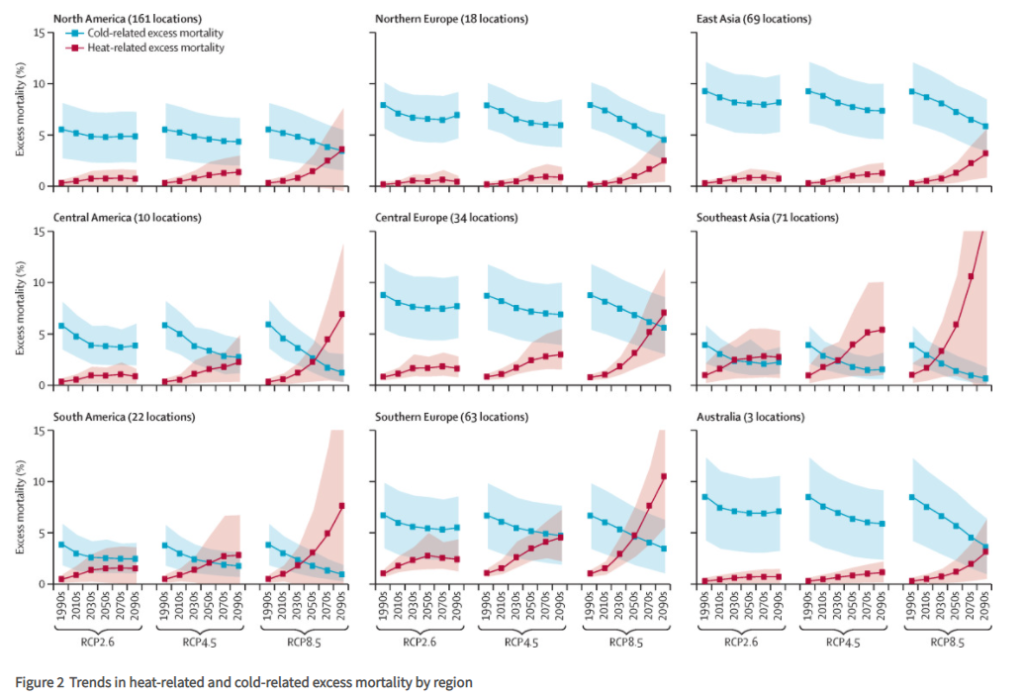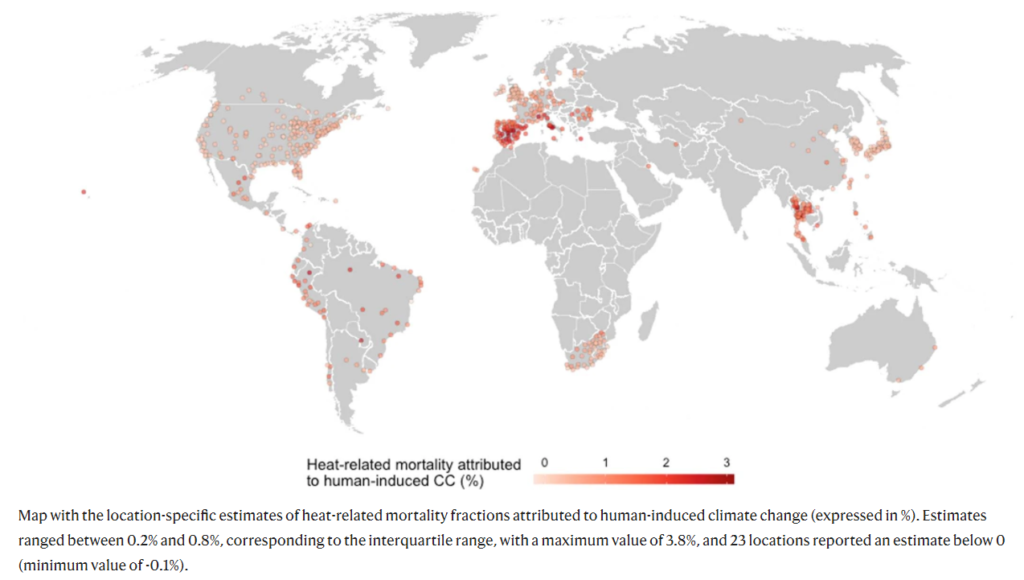Link: https://www.thelancet.com/journals/lanplh/article/PIIS2542-5196(17)30156-0/fulltext
Graphic:

Excerpt:
Our dataset comprised 451 locations in 23 countries across nine regions of the world, including 85 879 895 deaths. Results indicate, on average, a net increase in temperature-related excess mortality under high-emission scenarios, although with important geographical differences. In temperate areas such as northern Europe, east Asia, and Australia, the less intense warming and large decrease in cold-related excess would induce a null or marginally negative net effect, with the net change in 2090–99 compared with 2010–19 ranging from −1·2% (empirical 95% CI −3·6 to 1·4) in Australia to −0·1% (−2·1 to 1·6) in east Asia under the highest emission scenario, although the decreasing trends would reverse during the course of the century. Conversely, warmer regions, such as the central and southern parts of America or Europe, and especially southeast Asia, would experience a sharp surge in heat-related impacts and extremely large net increases, with the net change at the end of the century ranging from 3·0% (−3·0 to 9·3) in Central America to 12·7% (−4·7 to 28·1) in southeast Asia under the highest emission scenario. Most of the health effects directly due to temperature increase could be avoided under scenarios involving mitigation strategies to limit emissions and further warming of the planet.
Author(s):
Antonio Gasparrini, PhD
Yuming Guo, PhD
Francesco Sera, MSc
Ana Maria Vicedo-Cabrera, PhD
Veronika Huber, PhD
Prof Shilu Tong, PhD
Micheline de Sousa Zanotti Stagliorio Coelho, PhD
Prof Paulo Hilario Nascimento Saldiva, PhD
Eric Lavigne, PhD
Patricia Matus Correa, MSc
Nicolas Valdes Ortega, MSc
Haidong Kan, PhD
Samuel Osorio, MSc
Jan Kyselý, PhD
Aleš Urban, PhD
Prof Jouni J K Jaakkola, PhD
Niilo R I Ryti, PhD
Mathilde Pascal, PhD
Prof Patrick G Goodman, PhD
Ariana Zeka, PhD
Paola Michelozzi, MSc
Matteo Scortichini, MSc
Prof Masahiro Hashizume, PhD
Prof Yasushi Honda, PhD
Prof Magali Hurtado-Diaz, PhD
Julio Cesar Cruz, MSc
Xerxes Seposo, PhD
Prof Ho Kim, PhD
Aurelio Tobias, PhD
Carmen Iñiguez, PhD
Prof Bertil Forsberg, PhD
Daniel Oudin Åström, PhD
Martina S Ragettli, PhD
Prof Yue Leon Guo, PhD
Chang-fu Wu, PhD
Antonella Zanobetti, PhD
Prof Joel Schwartz, PhD
Prof Michelle L Bell, PhD
Tran Ngoc Dang, PhD
Prof Dung Do Van, PhD
Clare Heaviside, PhD
Sotiris Vardoulakis, PhD
Shakoor Hajat, PhD
Prof Andy Haines, FMedSci
Prof Ben Armstrong, PhD
Publication Date: 1 December 2017
Publication Site: The Lancet
